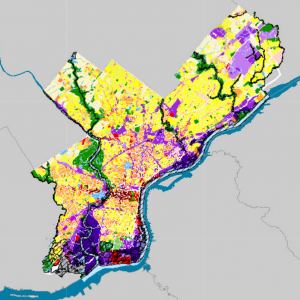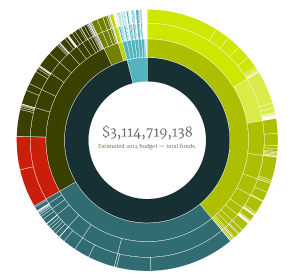If ground zero for the open-data movement in Philadelphia exists, there’s a single-story office space in Northern Liberties with a good claim to the title. In 2011, Devnuts—the unfortunate-sounding name for the so-called tech community center —hosted a hackathon that proved to be a critical moment in the growth of the civic-hacking community. At the time, the thought of local-governmental entities giving data away like Halloween candy seemed as unlikely as the word hacker holding the promise of an aspirational, non-criminal career. But both came true and in short order.
A few months after SEPTA tentatively handed over a single data set (the real-time bus feed) for the Devnuts hackathon, along came SEPTA.mobi, a mobile website that tracks the locations of buses and trolleys throughout the transit network in real time. SEPTA.mobi demonstrated that citizen-made products could compete with anything that a government agency could put out. (For example, the cut-rate official SEPTA app, with its shabby two-star rating at the Apple App Store.) Soon after, SEPTA opened the floodgates of its data, then, a year later, Mayor Nutter signed the Open Data executive order. The acknowledgement from the city government seemed clear: Never ask a city agency to do a nerd’s job. “When you look at governments building these interfaces, they kind of suck at it,” says Chris Alfano, one of the creators of SEPTA.mobi and cofounder of tech company Jarv.us Innovations. “The government should focus on providing a robust set of basic services that other organizations, entities and citizens can build on top of.”
Code for Philly creations have impressed journalists and readers of Technically Philly, most of the public would be hard-pressed to know what the brigade does.

Now, though, the civic-hacking community—which still has weekly Code for Philly meet-ups at Devnuts (Alfano insists they’re rethinking the name)—has reached another critical moment: it’s hit a plateau. The volunteer-run Code for Philly, arguably the cornerstone of the civic-hacking community, finds itself at a crossroads. Fighting the city on releasing troves of data is no longer the primary concern (they’ve released over 200 sets from a slew of city departments).
“The movement has matured to the point that opening data isn’t the end goal,” says Dawn McDougall, the executive director of Code for Philly, who, it bears mentioning, is an unpaid full-time employee. “I think we’ve been so good at delivering on so little. We’re definitely the epitome of Philly in many ways, taking a small set of resources and making it work … but that only lasts for so long.”
It could be said Code for Philly was broke from the start. By design, in fact. The group, technically known as a “brigade,” was born out of Code for America, a nationwide initiative to utilize open-source technology to make government services more efficient and transparent, by placing a fellowship of coders in select cities around the country for a year. As Alfano says, “a large part of our approach is to go to people who are solving a problem already and figuring out what tools they need.”
Philly was the only city in the country to participate in the first two cohorts of Code for America, in 2011 and 2012. By the end of the first two cycles, and with the city willing to play ball with the hackers (Mayor Nutter’s executive order the most visible sign), Philly quickly formed a reputation as one of the strongest civic-hacking groups nationally. There were bumps along the way, including the city’s first Chief Technology Officer resigning unexpectedly, but the community has undoubtedly grown for the better. A large part of credit is due to the energies of Code for Philly members, including Alfano (an original co-captain of the brigade), who’ve grown the brigade into a 1,700-person-strong Meetup group that hosts that hosts four hackathons each year in addition to the weekly gatherings at DevNuts. But aside from an anonymous grant covering a lot of the costs in 2014, the group’s expenses have gone on the Jarv.us card. Because all the brigade’s products are open-source, there’s no monetization or even ownership of them. So when the Philadelphia Police Department imbeds into its website the nifty Crimemapper visualization tool created by Code for Philly, there’s no licensing from the brigade, as would occur in the private sector—nor should there be, to preserve the integrity of the civic component of civic hacking.
There’s no paid staff or resources to broadcast the merits of Septa.mobi or Crimemapper or the School Budget Visualizer—or whatever else Code for Philly could accomplish with a few more resources.
Code for Philly creations have impressed folks in the city, along with journalists and readers of Technically Philly, but most of the public would be hard-pressed to know what the brigade does. That disconnect exists for a couple of reasons. One is illuminated by a recent Pew report suggesting the general public remains skeptical of open-data utilities. Only half the respondents said open data would make government more accountable or improve the quality of government services. But only 32 percent of respondents had accessed local-government websites or data in the last year—and when they did, it was typically for run-of-the-mill reasons like paying for parking tickets rather than interacting with civic-hacking apps. That suggests with more exposure to civic-hacking creations, the public might be more supportive of the cause.

The second reason for a degree of disconnect with the public can be chalked up to the fact that Code for Philly is a volunteer-run army. There’s no paid staff or resources to broadcast the merits of Septa.mobi or Crimemapper or the School Budget Visualizer—or whatever else Code for Philly could accomplish with a few more resources. In Chicago, a nonprofit backed by the MacArthur Foundation helps facilitate partnerships between technologists, nonprofits and the city government—and champions the civic-hacking cause to the public. In Philly, the issue is not a shortage of interested parties wanting to form similar partnerships (indeed, Philly ranks fifth among all U.S. cities in terms of how much data it has released and has interested newcomers at the meetups each week) but a deficit of resources. “We’re at this crisis right now where all these organizations and city agencies want to work with us. They’re all at the table and want to move ahead with open data,” says Alfano. “But we just don’t have the capacity to engage everyone.”
Alfano and others are exploring the process of starting a nonprofit that borrows from what exists in Chicago, but one that’s more narrowly focused around growing the ecosystem around the brigade. But they’re still soliciting input and support for such an organization. “I think there’s a really valuable pitch to be made to technology companies: Invest in Code for Philly and we’ll make Philly a more attractive place for people who have a choice to come in where they work,” he says.
As a second-tier startup city, Philly is firmly in the shadows of Boston, New York, Seattle and San Francisco. In local technology circles, people often bemoan how much talent has been lost to those destinations. That’s been true of some of Code for Philly’s top talent, including one developer who took a job at Amazon, but for others, they’ve chosen to stay. The first two Code for Philly fellows are now working at the nascent Office of Innovation and Technology in City Hall. Their decision to go into government—rather than more lucrative gigs in the private sector—speaks to something McDougall says: “Civic tech is all about using technology to become more civically engaged.”
Alfano believes that credo is how Philly can set itself apart as a technology hub. The calling card for the cities who’re poaching our best and brightest is commercial opportunities. What if Philly invested in its identity as a civic-tech capital of the country? “All the ingredients are in place, we just have to connect the resources to the community,” says Alfano. “We can make Philly known as the place where technology matters, not just cat-photo-sharing apps.”



